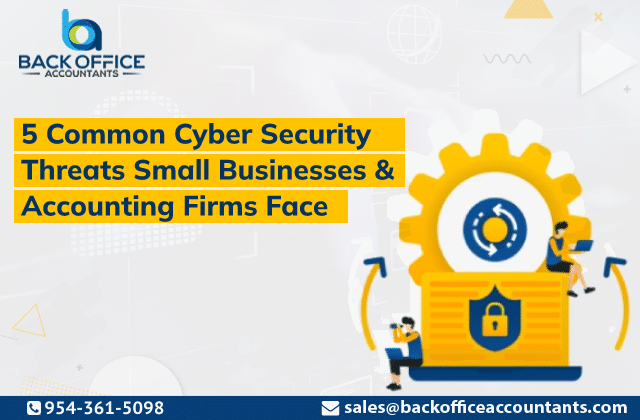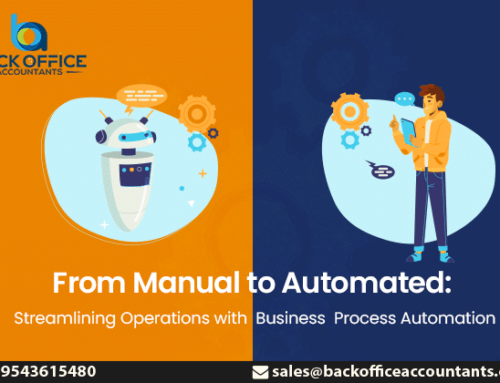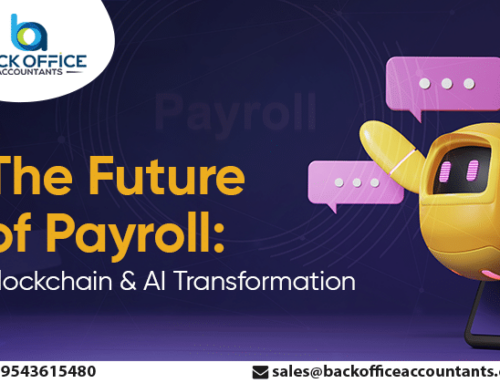No industry today is immune to cybercrimes and financial devastations they trigger. On an average these cyber security breaches are reported to cost more the $1.5 trillion annually to global businesses and it is still a low estimate. Given the sensitive number world it is, financial and accounting industry is a ripe ground for cyber security attacks and the affects naturally are catastrophic.
For any business, a cyberattack on their financial systems will be devastating. For an accounting firm the breach could be a death knell to their reputation. So whether you are a business with a growing accounting department or an accounting firm that is starting out it is absolutely essential to guard against the cyber security threats that hover around.
The first step in this process is to be aware of the common cybersecurity threats in accounting industry. As a remote accounting firm, Back Office Accountants has garnered quite a reputation for our secure and successfully track record over the years. Today our accounting experts will identify 5 common cybersecurity risks that can wreak havoc to a vulnerable accounting department. Read on to know:
5 Common Cyber Security Threats Small Businesses & Accounting Firms Face:
1. Spyware: Spyware is a malicious software that is hid in the system to harm them while extracting sensitive information. It belongs to the category of malware which accounts for 40% of the total cyber-attacks worldwide.
As the name suggest the spyware stays hidden in the system to spy and gather information without the awareness of the user. Working in the background it can quietly swoop in the login credentials, browsing history, email addresses, credit card numbers and whole a lot of sensitive financial information. Advanced spyware can even record the keystrokes without the knowledge of the user.
2. Ransomware:While Spyware stays hidden and spies on your data Ransomware openly can block access to your sensitive data until a ransom is paid. Hackers usually encrypt the sensitive data that is key to the organisation and demand ransom to unlock the data. Small and medium businesses due to the lack of robust cybersecurity system with endpoint protection often fall prey to ransomware attacks. As these business do not have sufficient backup and contingency plans they become easy target for these attacks.
If you are a small and medium business we advise you to equip yourself with a strong security system with endpoint protection. Also invest in a comprehensive cloud data backup solution to help you combat data loss in case of potential attack.
3. Phishing:Phishing is a form of social engineering that is targeted with shady e-mails/messages that persuade users to click malicious links. It is a common form of cyberattack and has many levels of execution and it needs only one click to duped making it a dangerous proposition for the unaware.
A phishing usually starts with an e-mail or a text which upon clicking purvey the sensitive data – credit card numbers, login credentials and bank account information. Advanced phishing attacks also clone websites, landing page and login dashboards to extract sensitive information. Almost always phishing include social engineering where the hackers hyper-targets the user to build credibility.
An accounting firm can avoid the phishing attacks by having right security measures in place. At Back Office Accountants we conduct regular training sessions to educate personae about different kinds of phishing attacks and standard guidelines to be followed.
4. Distributed Denial-of-Service (DDoS) Attacks: Distributed Denial-of-Service (DDoS) attacks are now being commonly used to carry out malicious activities in accounting industry too.
It is powerful strategy where cybercriminal target the website-based services rendering them unavailable for its user community. In accounting industry it can impact the clients’ ability to file return on time or any other information or services being delivered. The attackers contentiously flood the server with request for data until it doesn’t keep you and the services becomes unavailable. The service or website is then used as ransom to extort money and may even cause even deeper damage.
5. Weak passwords, insider threats & human errors: Like another industry, accounting industry suffer from insider threats – malicious actions of employees, contractors, associates or former employees.
Weak passwords is most common way accounting firms or businesses fall into the hands of hackers who are adept at bypassing them for their advantage. Given most businesses use multiple cloud based accounts and tend to use simple passwords they are easily manoeuvrable by the hackers.
Human errors are another common way accounting firms suffer data breaches and cyber-attacks – according to Kaspersky 90% of data breaches are caused by them. Usage of personal devices for office activities is the most common cause of the human errors which is why we advise business to limit the usage of personal devices while handling the accounting data.
Cybersecurity Risks – Bane of Accounting Industry:
Cyber security risks are bane of financial and accounting industry. It is not uncommon to hear about data breaches even in the most secure premises. In the light of these cybersecurity incidents business are investing, massively on their cybersecurity infrastructure and an accounting professional has a crucial role to play in risk identification, measurement and design of right systems to reduce the risk of attacks.
As a leading remote accounting firm in the business, Back Office Accountants ensures secure and risk-free environment powered by robust security protocols and guidelines. We conduct regular training sessions for our personnel and adopt latest security measures to avoid all the potential cyber-attacks and deliver the best remote accounting services. If you are looking to outsource your accounting services, you can contact us here: https://www.backofficeaccountants.com/
As the number of cybersecurity incidents continue to rise and stakeholders are becoming increasingly concerned, companies are devoting considerable resources to their cybersecurity risk management efforts and related cybersecurity disclosures.
For businesses, a cyberattack can mean a significant loss of time while systems are held ransom, and the costly expenses of notifying clients, analyzing the attack, remediating the business, and paying for monitoring.







